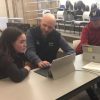KJIPUKTUK (Halifax) – Dalhousie Legal Aid Service is restarting its Legal Education for Advocates Project (LEAP), which is meant to help train advocacy workers in legal issues related to poverty law.
This encompasses the rights of low-income individuals and can include family law, income assistance, residential tenancies, the court process as a whole, and a multitude of other things.
To decide which legal issues our training will focus on we have reached out to several advocacy groups to better understand the issues they are facing, including youth and women’s shelters, Indigenous and African Nova Scotian Cultural Centres, and family/criminal law advocacy groups.
In an effort to gain a better view of the whole picture, we would like to reach out to the general community to figure out what legal issues people believe need to be addressed most with advocacy staff.
These issues can be about anything regarding poverty law and should hopefully be something that can be addressed with greater knowledge of the subject matter.
Leave your comments here (note, it may take a while to show up, since comments are moderated). You can also leave a message or comment on the Nova Scotia Advocate Facebook page.
Finally, if you wish you can email me, Robert Devet, rdevet@gmail.com, and I will make sure the Dalhousie Legal Aid folks get to read it.




I think it would be good to incorporate information about the ways in which gender based violence and poverty work to victimize and trap people, and how the social assistance system exacerbates that. For example, with such low benefit rates and limited affordable housing options, victimized people can get trapped in bad situations because they can’t afford to take back control. This is even more true if they are a member of a minority population (LGBTQ2+, racial minority, etc.). An intersectional feminist analysis is important. Thank you for all you do.
The most impoverished and marginalized people in our communities won’t be able to take such a course.
So.
You could talk about the infrastructure that has been built around legislated poverty. Poverty is profitable to some folk. You know, examine how many people ( and who) benefit in the form of employment or C.V. padding, from keeping people in abject poverty.
Income Assistance and residential tenancies. Income assistance is fairly self-explanatory, and I see a lot of rental applications these days that request information that I am pretty sure they’re not supposed to ask about.